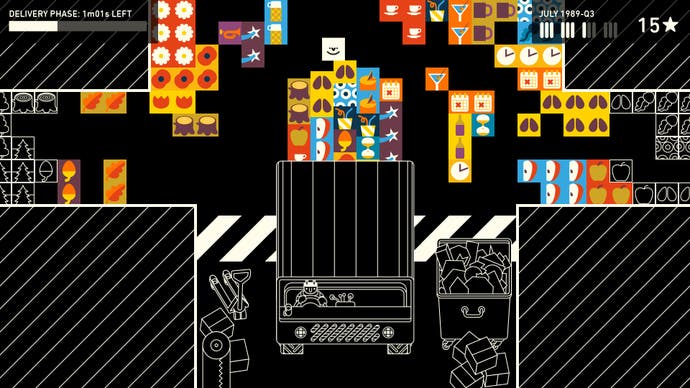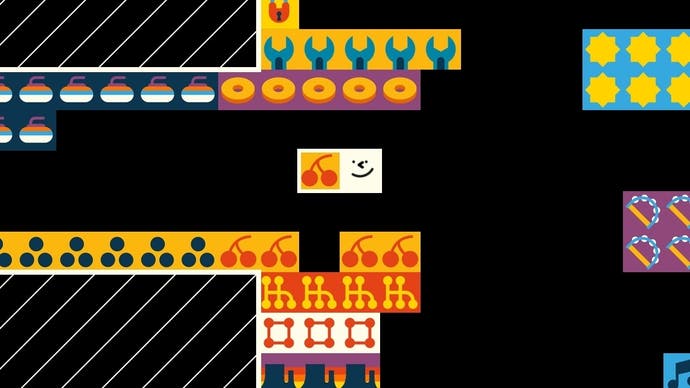Wilmot's Warehouse is a puzzler with an intriguing roominess at its centre
A space odyssey.
Wilmot's Warehouse is a puzzle game that's made me really think about puzzle games. This shouldn't be surprising, since the people who made it were also some of the people responsible for the glorious game Hohokum, which made me think about all kinds of unexpected things. Hohokum was expansive and constantly surprising, Wilmot's Warehouse is tightly focused - and constantly surprising. It's surprising, I would argue, in a way that puzzle games usually are not.
Wilmot's Warehouse, which is out now for PC, Mac and Switch, is all about running a warehouse. Peer beneath the abstracted visuals and you are a little guy in a very big room, taking in consignments of various goods, storing them, and then delivering specific goods to people who want them, when they pop up behind a roller-door at the far end of the playing area. Everything is a little square here. You are a little square, the people who order specific goods are little squares. And the goods themselves are little squares, divided up by different designs - some have stars or crosses on, others resemble springs or security cameras or magnets.
You can only see the specifics of the goods when you're very close to them, and the warehouse is pretty big. This suggests that the game is all about tension. I was prepared for a sort of satirical look at how awful it is to work at Amazon, say, with the relentless grind of new goods coming in and the orders stacking up, the warehouse measureless to man. I was ready to panic - and there is certainly some of that to Wilmot's Warehouse. But there's something more too. Something really interesting.

Simply put, you can organise the goods in the warehouse in any way you please. You can arrange them by colour. You can stack them depending on the order they first came in. If you want, you can leave stuff how it arrived, in big jumbled palette-loads and just dip in and out picking what you want when the orders come through. It's all up to you.
And for some reason this completely blew my mind.
I think it's because puzzle games are so prescriptive. Do this to get points, avoid that to stay alive. This goes here, that goes there, onwards and upwards, faster and faster. Wilmot has a bit of that, but it also wants you to do your own thinking about such a crucial aspect of the game - how the goods you handle are arranged. There is a freedom and self-expression here that goes beyond the self-expression I find in something like Lumines or Tetris. I get to choose where to put the blocks in these games, sure, but where I put them is something the game judges explicitly by marking how many lines I clear or how many squares the timeline sweeps up. In Wilmot, as long as I can find the goods that are ordered in a timely fashion, the game doesn't care how I've arranged them. It isn't tracking them.
I find it pretty wild that there is this space at the centre of the game that the game itself doesn't really monitor. At least, it doesn't monitor it in the same way Tetris monitors whatever's in the well. It's a reminder to me that so much of a puzzle game is playing out on my side of the screen in the first place. So much of it is to do with my approach, which parts of the rules I am drawn to and what I value in the whole experience.
So it's a game about space and there's this somewhat daunting, somewhat intoxicating roominess at its heart. In other words, Wilmot's Warehouse is kind of brilliant.

